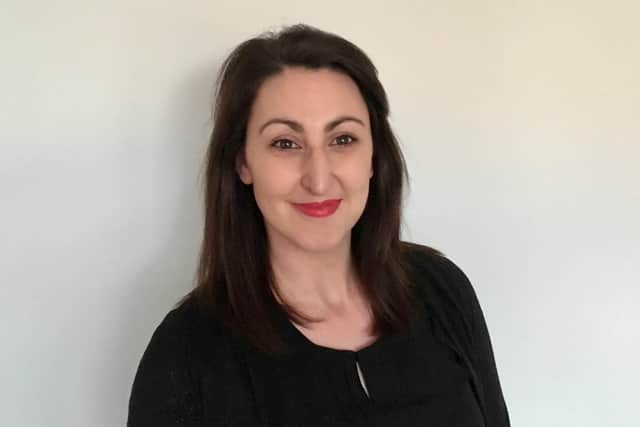The damage drinking does to your brain: How a service in NI is providing life-saving rehabilitation


As we emerge out of lockdown and bars and restaurants re-open, many of us will think little of the harm alcohol is doing to our bodies, and, more particularly, our brains.
Northern Ireland’s drinking culture is infamous, but there is a dark side to the excessive consumption - a spiralling public health challenge with experts highlighting that two per cent of population are living with Alcohol Related Brain Injury (ARBI).
Advertisement
Hide AdAdvertisement
Hide AdNaomi Brown, clinical lead at Northern Ireland’s only Alcohol Related Brain Injury Unit, at Leonard Cheshire, said: “In Northern Ireland it is socially accepted that you have a few drinks.


“The health guidelines for safe drinking are 14 units, about six pints or a bottle and a half of wine, a week, spread over three, or more, days.
‘‘I think if people were honest there are plenty that would consume more than that over a week.”
In terms of alcohol-related brain injuries, she said most have an inaccurate perception.
Advertisement
Hide AdAdvertisement
Hide Ad“They assume the individual must have fallen down the stairs, or sustained a trauma of some sort whilst drunk, but that is not the case.
‘‘Alcohol related brain injury is from a prolonged period of alcohol misuse - someone who is drinking 35 plus units a week over a period of at least five years.
“The damage will be visible on (brain) scans,’’ she said.
Ms Brown described how the condition manifests and how ARBI is often confused with dementia, leading some patients to being misdiagnosed and placed in care homes.
“There are some similarities with dementia, like memory loss. But the key difference is that unlike dementia, ARBI not a progressive condition.
Advertisement
Hide AdAdvertisement
Hide Ad“Obviously if someone continues to drink alcohol to high levels, over 35 units, the brain will continue to deteriorate,
‘‘But stopping the use of alcohol and getting the correct vitamins for brain function, plus having the right rehabilitation support, means the outcomes are really good.
‘‘Research would suggest that up to 75 per cent of people who have been diagnosed have potential for recovery; whilst 25 per cent would be expected to fully recover after a couple of years of rehab and remaining off the alcohol and taking the right vitamins.’’
That rehabilitation is being provided by Leonard Cheshire, a leading disability charity which opened a specialist rehabilitation unit for ARBI in east Belfast in February this year.
It is the first of its kind across the island of Ireland.
Advertisement
Hide AdAdvertisement
Hide AdThe 14-bed residential rehabilitation unit is, according to Ms Brown, helping to break the chronic cycle of inadequate care for ARBI patients.
“People were falling between the cracks.
“We have patients who have been referred to us who are in their 40s and are actually currently living in a nursing home placement, which isn’t really ideal.
“Some of them may have got picked up by the likes of the brain injury services, who possibly wouldn’t have had the addictions experience and trauma background, and vice versa, some of these people may have ended up in mental health services, but they weren’t able to get the neurological input that they possibly needed.
“Quite a lot of them would have been repeat admissions into hospital for the likes of liver management.
Advertisement
Hide AdAdvertisement
Hide Ad“So, they would have gone in and out of acute medical services or they might have been getting picked up by a community mental health team.
“But in terms of one service that covered all of those issues that go hand-in-hand with alcohol-related brain injury, the trusts didn’t have anything in place.”
And that is where Leonard Cheshire plugs the gap, working alongside the trusts with a multi-disciplinary team of speech and occupational therapists, physiotherapists and neuro psychologists, and more, to treat patients.
Ms Brown said: “In terms of the unit, we are, for want of a better phrase, a ‘dry unit’.
Advertisement
Hide AdAdvertisement
Hide Ad“Everyone that moves in is already abstinent from alcohol. Obviously there are other places that will help people come off alcohol, that is not what we do, it’s purely the rehab for the brain injury.”
Ms Brown said the unit has been designed to feel like a home-from-home, rather than a traditional residential nursing home setting.
“I am very proud of the unit we have put together. When you come in it feels like a lovely big house.
“All rooms have individual en-suite shower rooms. There’s a communal laundry room and kitchen and living areas.
Advertisement
Hide AdAdvertisement
Hide Ad“The residents are encouraged to do as much as possible for themselves. They do their own washing and ironing and they are encouraged to make their own lunches.
“Our aspiration, with everyone, is to move them back into community living.
“That won’t be possible for everyone and we are aware of that, but we want to make people as independent as we possibly can.”
She said every resident has an individual rehab plan suited to their needs and interests.
Advertisement
Hide AdAdvertisement
Hide Ad“We might have some people who are really into arts and reading and we have other people who could think of northing worse, so they’ll have activities they are interested in.’’
The unit was only really getting into its stride when the coronavirus pandemic hit and lockdown happened.
Ms Brown admitted it has been a challenging time.
“Lockdown really scuppered our plans.
“We had just stared a ten-pin bowling league and we were gong out to Tai Chi classes. We are really hoping to get going with all of that next month.”
Leonard Cheshire’s ARBI unit has only been open a short time, although it has been three years in the planning, but Ms Brown said she is hopeful it will change people’s lives.
Advertisement
Hide AdAdvertisement
Hide Ad“We are giving people who are in their 40s and 50s the chance, with a year or two of rehabilitation and the right medical care, the opportunity to be able to go back into the community and live independently again, versus somebody who doesn’t get that input and spends the next 20, 30, potentially, 40 years, in a nursing home placement.
“In terms of quality of life, the socio-economic benefits there for our community, removing the drain on the healthcare system, there’s so many benefits in terms of actually giving these people the opportunity to recover.”
*Leonard Cheshire has been supporting disabled people in the UK and around the world for more than 70 years.
A message from the Editor:
Thank you for reading this story on our website. While I have your attention, I also have an important request to make of you.
Advertisement
Hide AdAdvertisement
Hide AdWith the coronavirus lockdown having a major impact on many of our advertisers - and consequently the revenue we receive - we are more reliant than ever on you taking out a digital subscription.
Subscribe to newsletter.co.uk and enjoy unlimited access to the best Northern Ireland and UK news and information online and on our app. With a digital subscription, you can read more than 5 articles, see fewer ads, enjoy faster load times, and get access to exclusive newsletters and content. Visit https://www.newsletter.co.uk/subscriptions now to sign up.
Our journalism costs money and we rely on advertising, print and digital revenues to help to support them. By supporting us, we are able to support you in providing trusted, fact-checked content for this website.
Alistair Bushe
Editor